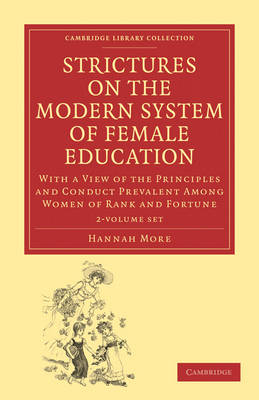Cambridge Library Collection - Education
1 primary work • 3 total works
Volume 2
Strictures on the Modern System of Female Education: Volume 2
by Hannah More
Published 28 October 2010
A unique and influential public figure in her time, Hannah More (1745-1833) was a prolific writer. This two-volume study, published in 1799, is her definitive work on women's education, which went through thirteen editions by 1826 and sold over 19,000 copies. The work outlines More's belief that women's education and conduct determined the moral state of a nation, reflecting her acceptance of eighteenth-century views on the status and education of women. In Volume 2 More argues that, with proper education, women - viewed by her as naturally more religious than men - could regenerate Christianity. She also discusses conversation, fashionable life and public amusements. The modern reader will find More's conservative stance on women's rights a fascinating contrast to more liberal works of the age, including Mary Wollstonecraft's A Vindication of the Rights of Women. For more information on this author, see http://orlando.cambridge.org/public/svPeople?person_id=moreha
Strictures on the Modern System of Female Education: Volume 1
by Hannah More
Published 28 October 2010
A unique and influential public figure in her time, Hannah More (1745-1833) was a prolific writer. This two-volume study, published in 1799, is her definitive work on women's education, which went through thirteen editions by 1826 and sold over 19,000 copies. The work outlines More's belief that women's education and conduct determined the moral state of a nation, reflecting her acceptance of eighteenth-century views on the status and education of women. In Volume 1, a heavy emphasis is placed on the need for women to observe propriety, and More argues that women should seek to acquire knowledge and discipline rather than accomplishments. The modern reader will find More's conservative stance on women's rights a fascinating contrast to more liberal works of the age, including Mary Wollstonecraft's A Vindication of the Rights of Women. For more information on this author, see http://orlando.cambridge.org/public/svPeople?person_id=moreha
Strictures on the Modern System of Female Education 2 Volume Set
by Hannah More
Published 28 October 2010
A unique and influential public figure in her time, Hannah More (1745-1833) was a prolific writer. This study, published in 1799, is her definitive work on women's education and was enormously successful, going through thirteen editions by 1826 and selling over 19,000 copies. The work outlines More's belief that women's education and conduct determined the moral state of a nation, reflecting her acceptance of eighteenth-century views on the status and education of women. Large sections of the book are devoted to the importance of religion, and this provides the context for More's discussions of conversation, fashionable life and public amusements, and 'the moral benefits of accuracy in language'. More's conservative stance on women's rights make a fascinating contrast to more liberal works of the age, including Wollstonecraft's Vindication of the Rights of Women. For more information on this author, see http://orlando.cambridge.org/public/svPeople?person_id=moreha

